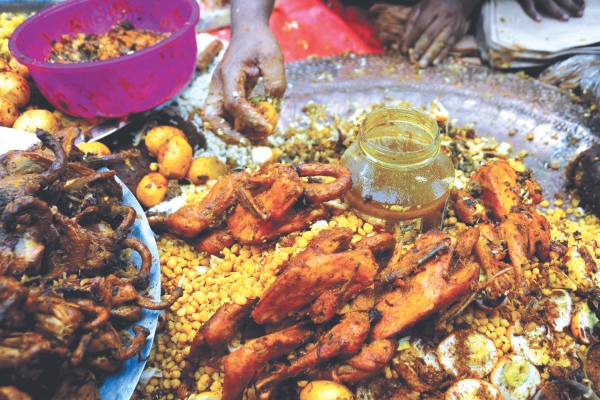| Home - Back Issues - The Team - Contact Us |
 |
| Volume 11 |Issue 30| July 27, 2012 | |
|
|
Health To Eat or Not To Eat Sarara Hasan Hot and crunchy piyaju, crispy and gooey slices of beguni, sweet and sticky coils of jilapi and spicy and tangy spoonfuls of halim (with a tiny squeeze of lemon and a sprinkle of coriander leaves, ginger and onions, of course). Makes your mouth water, doesn't it? The holy month of Ramadan is when these delicious delicacies can be seen on most of the dining tables of Muslims all over Dhaka during iftar. After a long day of fasting, it can be a pretty difficult task to break it. Sometimes, breaking the fast can be harder than fasting. With an inactive digestive system for almost the whole day, it's natural for your stomach to be extra sensitive. Many nutritionists say that high calorie-based foods such as piyaju and beguni should be eaten less or not at all during iftar. Since you've fasted for the whole day and your stomach hasn't had anything, your digestive system has slumbered. So if you suddenly take in high calorie foods, there is a chance that it may cause acidity in your stomach and gas can take form. For people suffering from heart disease or diabetes, these types of high calorie foods should best be avoided completely.
While these tasty savouries dripping with grease and deep-fried are known as comfort food, they do not settle very comfortably in the stomach. One of the most common causes of stomach problems during this time is overeating during iftar. Just because you are feeling really hungry, doesn't mean that you need to stuff your stomach with so much food. Do not overeat! Try and listen to your body and eay the amount of food that your body needs instead of what it wants. Discern the difference between cravings and hunger. Never feed your emotions. Stop eating at a point where you know that eating just a little more will make you full. You don't want to be full, we all know how hard it is to move around afterwards. Decide ahead of time what you want to eat and the amount of food you want to eat, during iftar, rather than eating from an urge. You will feel satisfied with small amounts of food instead of feeling sluggish and tired after overeating. Eating rich foods full of fat, salt and processed sugars will most likely cause headaches, nausea and weakness. There are a lot of people who even think that since they haven't eaten anything for the whole day, plunging into heaps of food during Iftar will not harm them. Well, they're wrong. Suddenly eating so much of high calorie or fatty foods to fill a stomach that has been empty for a while will cause you to gain weight. Because your intestines are asleep, once you push all of the food in, your stomach will be unable to digest it properly and thus, lead to weight gain. When you have your iftari, eat slowly and chew your food well. Saliva present inside your mouth, when you eat, contains enzymes that assist in digestion. So if you eat slowly, you will give more time for the enzymes to break down the food that you are chewing inside your mouth. The enzymes in saliva can digest up to 80 percent starch, 30 percent protein and 10 percent fat.
They say that, “the more the food looks or tastes good, the worse it is for you”. Well, that's just a saying. Many nutritionists say that the best thing to eat, after a long day of fasting, is light types of food. Light types of food meaning foods which are rich in vitamin, water or anything that is easily digestible. Fruits are the best example. A handful of fruit will be satisfying to your stomach. Eating fruits on an empty stomach will play a major role in detoxifying your system, supplying you with a great deal of energy for weight loss. Because the digestive system has to work less, there will be boundless energy to spare. To most people, fruits or any type of healthy food are just unappetizing. Well there is a way that you can work to make healthy food appealing. A banana and guava tastes great without preparation but having them sliced into a fancy bowl, sprinkled with chopped dates and chilled in the refrigerator will maintain your enthusiasm for eating healthy. If you find it hard to gulp down in fruits on an empty stomach, you can even chop them up, blend them and drink it up as a juice! Juice is gentle nourishment to the body and it will be equally satisfying as having fruits as a whole. Many people are known to use fasting as a way of dieting and losing weight. You are what you eat. So maintaining a healthy eating after a long day of fasting is required for your body to work properly. If you can master the healthier way of breaking your fast, then you will have the secret of having a normal weight, health and obviously, happiness during the month of Ramadan. Well no matter what you eat for iftar, make sure you are enjoying it to the maximum. A little piyaju won't hurt. |
Copyright
(R) thedailystar.net 2012 |

